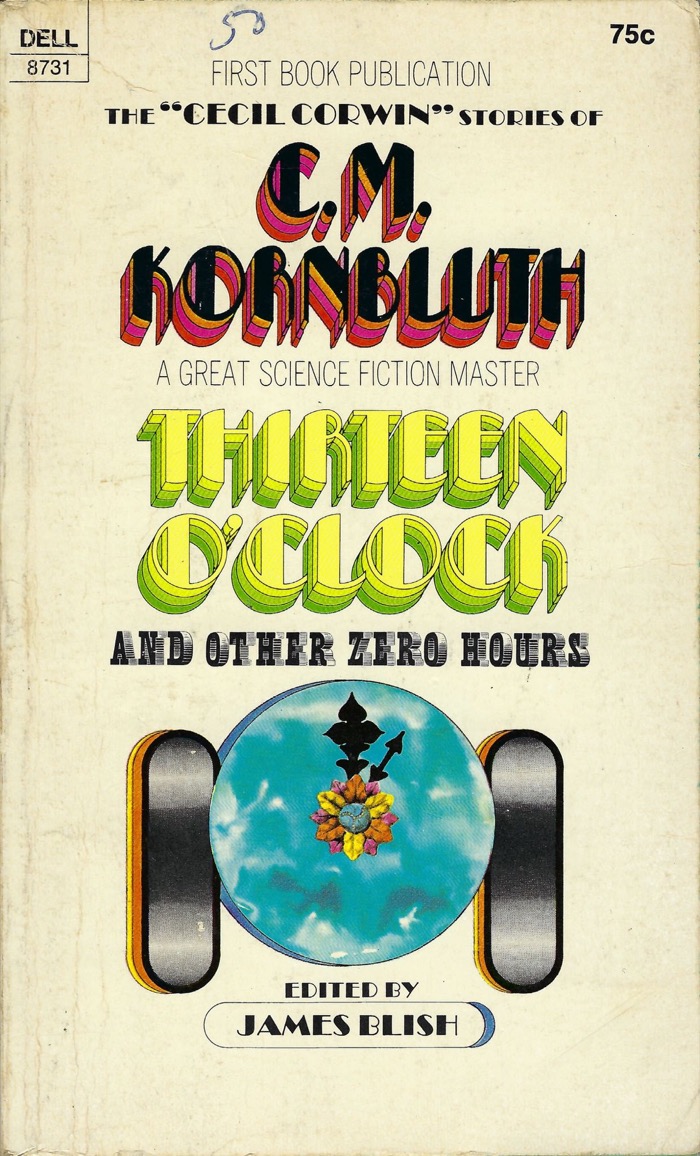Thirteen O'Clock and Other Zero Hours
Reviewed date: 2025 Aug 29
155 pages
I'm a fan of Kornbluth, usually, but these are not strong stories. They are competently written—Kornbluth is good at his craft—but not top-notch. Thirteen O'Clock and The Golden Road are pure fantasy so that was a strike against them in my book, but that's down to my personal preference. I prefer science fiction.
Thirteen O'Clock
Peter Packer finds his grandfather's old clock and winds it. The clock strikes thirteen—and transports Peter to the magical land of Ellil where he meets a beautiful girl (a sorceress named Melicent), gets in trouble with the local gang (the Peace and Progress Reform Party), collects an army of trolls, and goes toe-to-toe with the big boss himself: Mayor Almarish, who turns out to be grandpa Packer himself.
The Rocket of 1955
The narrator and others conspire to collect money to build a rocket to send a man to Mars, but pocket the money and send up a ramshackle rocket designed to explode on launch.
What Sorghum Says
Loner mountain man Sorghum Hackett meets a scientific man who convinces Sorghum to help him build a science-y machine. The science man dies before he can use the machine. In surprise, Sorghum accidentally activates the machine and gets transported back to ancient Rome. He makes his mark distilling "white mule" (that is, moonshine) and gets noticed by Lady Livia who sentences him to the gladiatorial games (the charge is sorcery). Sorghum gets himself and the rest of the doomed men drunk on moonshine, and they bravely defeat leopards and the emperor's prized lion. Sorghum then finds himself back on his mountain, never quite understanding what happened. It’s a well-told story but I’m quite sure that the Romans knew how to get drunk before an American time traveler showed up.
Crisis
Code Clerk Weems and Dr. Helen Carewe at the Bureau of Protocol in Alaska must manage an interplanetary diplomatic incident when the Serene Karfiness of Mars insults the Venus Plenipotentiary, which, due to various diplomatic vagaries, results in Venus cutting off diplomatic relations with Earth and start making war rumblings. They send a flurry of messages to the various embassies, messages that sound like code but are actually nonsense. This so flummoxes both sides that a well-timed message from Jupiter causes both sides to step back from the brink. War is averted once more.
The Reversible Revolutions
Lieutenant J. C. Battle, soldier of fortune and member of the exclusive Saber Club, finds himself caught between two revolutionaries who each wish to hire him: "Malachi Breen, manufacturer of Pot-o-Klutch and temporal director of Sweetness and Light, the new world revolution" on one side, Lenninger Underbottam, of Double-Action Kettlesnatcher Manufacturing Corp. and Chief of Devil Take the Hindmost on the other. Both want to take over the world.
Miss Spike McSweeney first tries to hire him to assassinate Breen; later she switches sides and helps him go after Underbottam. She finally reveals to Battle that she's a robot, a special model built by Breen, but she has a mind of her own.
Battle is stuck between the two rival revolutions, but clarity comes when Breen and Underbottam pool their efforts: they'll take over the world first, then flip a coin to see who gets to be in charge. Battle realizes that if either Breen or Underbottam succeed in conquering the entire world, he will be out of a job: a soldier of fortune in a world without war? So he and the rest of the Saber Club, and the robot Miss Spike McSweeney, go after Breen and Underbottam.
The City in the Sofa
J. C. Battle, soldier of fortune, is back. This time he's hired by Cromleigh to investigate a mysterious mohair couch at the Billionaire's Club. The couch is home to a miniaturized city of alien invaders, who use mind control to ensure nobody notices the couch. Cromleigh has a miniaturizer and sends Battle into the sofa for reconnaissance. Battle figures it out though: the "alien" invaders in the couch are just people hired by Cromleigh and painted green. It's Cromleigh who is the actual alien invader, and he--being the suspicious type--hired Battle to keep tabs on his newly hired staff of "alien invaders" who were actually just tapping phones and gathering information so they could manipulate the financial markets. It's not a terribly cohesive story.
The Golden Road
Colt dies of exposure in the high Himalayas and now must choose between joining one of two caravans of the dead: the Good or the Bad?
MS. Found in a Chinese Fortune Cookie
Narrator Cecil Corwin (pen name of author C. M. Kornbluth) describes how he found The Answer, a phrase that can solve any problem: from petty marital disagreements to the missile crisis. He's about to reveal it to the world when he's approached by members of the science fiction writers association: he's not the first to discover The Diagonal Relationship (their name for The Answer), and is in fact only the latest in several thousand writers who have deduced it. (Writers, science fiction writers in particular, are the only people whose breadth of knowledge is wide enough to have all the pieces to the puzzle.) When Corwin is slow to agree to keep the knowledge secret, they drug him and stash him in an insane asylum where he's kept drugged up. He bribes the attendant to delay his drug dose long enough to scribble down his story on cigarette paper and stuff it into fortune cookies (the making of which is one form of Occupational Therapy at the asylum) which is how Kornbluth found the story. Unfortunately the fortune cookies with the text of The Answer are missing.
